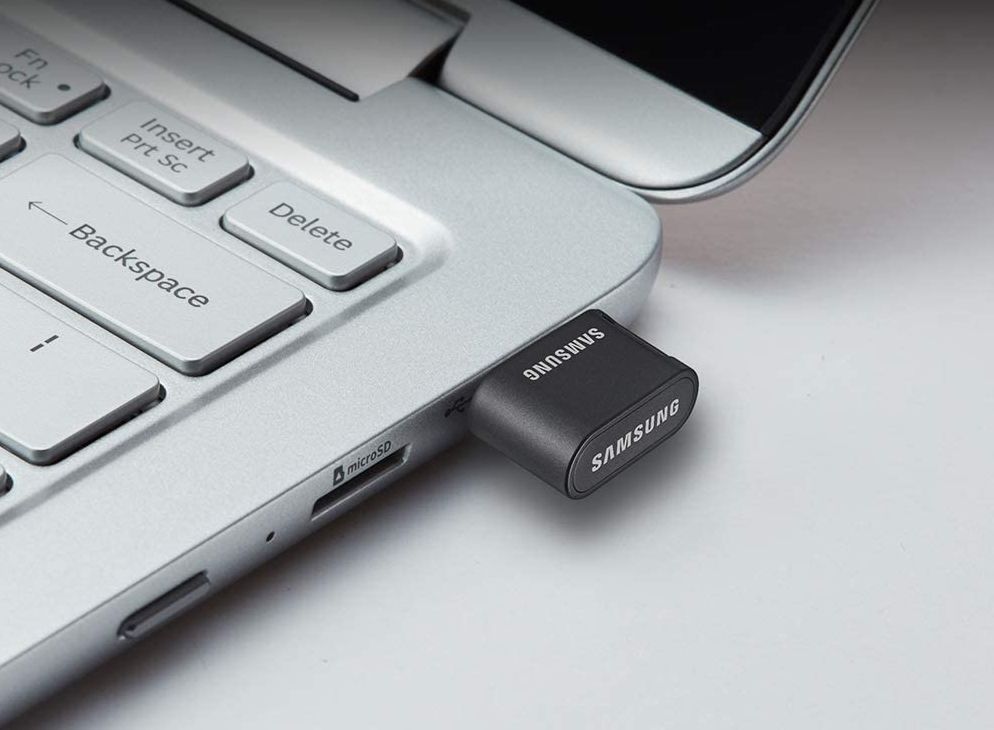
These Flash Drives Let You Access Your Most Precious Information From Anywhere
Products featured are independently selected by our editorial team and we may earn a commission from purchases made from our links; the retailer may also receive certain auditable data for accounting purposes.
WiFi, cloud storage, and fast cellular connections have helped transform the way we get digital data from one place to another, but that doesn’t mean you should only rely on them exclusively.
I’m a huge advocate for cloud storage, but I still keep a couple of flash drives handy. The pocket-sized accessory, also referred to as a thumb drive, usb stick or usb key, is the perfect way to take large files (video projects, computer backups, high-resolution photos, high-resolution music, etc.) with you everywhere.
The biggest benefit to keeping data on a flash drive is that your access isn’t limited by your internet speed. You may upload a big project to a cloud service at home, but downloading it in a hotel room or a client’s office may be hit or miss.
Unlike external hard drives, flash drives have no moving parts, so the chances of you losing any data by accidentally dropping it on the floor are reduced significantly.
If you haven’t used a flash drive in a long time, don’t worry, we’ve got you covered. We did some research and collected the best ones we could find below.
What You Need to Know Before Buying a Flash Drive
There are many factors to think about when choosing the right flash drive for you; below are the most important ones, which we considered while we were researching this list.
Size: Flash drives come in many shapes and sizes, and we made sure to pick ones that can fit easily in a pocket, purse, laptop bag, or briefcase.
Connector: Until recently, all flash drives used a USB-A ports, which have been standard on all computers since the mid-Nineties. As some computer manufacturers have moved away from USB-A in favor of USB-C (All of Apple’s MacBooks, for instance), some flash drives have USB-C connectors instead. Our guide has options for both, so you can find one that works best for your computer.
Storage Capacity: All of the flash drives on this list have can store at least 64GB (gigabytes) of data. That’s enough storage to hold hours of HD video, hundreds of pictures, or thousands of documents.
Compatibility: You can use all of the flash drives in our guide with either a PC or Mac. If you have Apple’s Camera Connection Kit, you can also plug them into an iPhone or iPad.
Data Transfer Speed: The flash drives in our guide all support the USB 3.0 standard, which has a maximum data transfer speed of 640MB/s (Megabytes per second). Most flash drives can’t hit that sustained speed, but still top out at around 150MB/s. For reference, most internet speeds cap out at roughly 37.5MB/s.
1. SanDisk Ultra 64GB Dual Drive
If you want a flash drive designed to be futureproof for the foreseeable future, SanDisk’s Ultra Dual Drive is the right choice.
The pocket-sized flash drive has two connectors: a USB-A connector on one end, and a USB-C connector on the other. This makes it compatible with any computer, no matter when it was released, and guarantees it’ll work with a new machine if you upgrade.
The Ultra Dual Drive comes in six storage tiers ranging from 16GB to 256GB, but we recommend 64GB as a good sweet spot for most people.
While all of our flash drives support USB 3.0, this flash drive actually supports the newer USB 3.1 standard, which allows it to achieve sustained data transfer speeds of up to 150MB/s. If you care about getting your files on and off your computer quickly, you’ll appreciate the speed bump.
The only real downside to this flash drive is that it’s a little bulky, which was a necessary design choice given the two connectors inside.
Pros: This flash drive’s pair of connectors allow you to connect it to USB-A and USB-C ports.
Cons: Slightly larger than most standard flash drives.

Courtesy Amazon
Amazon
2. Samsung FIT Plus
One of the hallmarks of flash drives is their small size, but Samsung’s FIT Plus takes that to the extreme.
The drive is less than one inch long, and under three quarters of an inch wide. This flash drive looks more like the wireless adapter some keyboards and mice use to connect to your computer. Just make sure not to lose this flash drive in a backpack or pocket.
It has a USB-A port, which makes it compatible with most, but not all computers, and comes in four storage tiers between 32GB and 256GB. Again, we recommend the 64GB option.
Because of its small size, you can keep the FIT Plus in your computer at all times. If you’re on a laptop, the part of the flash drive that that sticks out of your computer will be roughly 0.2 inches long, so you can keep it connected even if you use a laptop bag.
This flash drive supports USB 3.1 with a maximum transfer speed of 200MB/s, which makes it a good choice if you routinely move large files around.
If size is your primary concern, and you’re diligent about keeping track of your things, Samsung’s FIT Plus is a great flash drive.
Pros: Its ultra portable size allows you to keep it connected to your computer, even if you’re a laptop user who uses a bag or backpack.
Cons: Its smaller size makes it easier to lose.

Courtesy Amazon
Amazon
3. PNY Pro Elite
The biggest advantage of using a flash drive over cloud storage is having a ton of digital storage at your disposal at all times. PNY’s Pro Elite takes doubles down on that strength.
It’s roughly the same size as a typical flash drive, has a USB-A connector for maximum compatibility, and can transfer data at up to 250MB/s.
What makes it stand out is that you can get this flash drive in storage capacities up to 1TB, which makes the Pro Elite competitive with external hard drives.
We’re recommending the 512GB version, which likely holds enough data for you to make full computer backups. Having a full backup of every file on your computer that you can plug in anywhere, any time is really significant.
For instance, if your computer crashes on a trip, you can spend a couple of hours restoring it to its original state instead of waiting until you get home. If you’re on a business trip, that can make the difference of being prepared for a meeting and presentation, or scrambling to throw something together at the last minute.
You may not need a flash drive with this much storage, but if you do, the Pro Elite is your best option.
Pros: The PNY Pro Elite has enough storage to make a full backup of your computer.
Cons: A 512GB is more storage most people will need from a flash drive.

Courtesy Amazon
Amazon
4. Crucial 500GB X8 Portable SSD
Portable SSDs are kind of like the flash drive of the future: They hold a lot of data, use flash storage, transfer data incredibly quickly, and are highly durable and portable.
At 4.33 inches long and 2.1 inches wide, it’s roughly twice the size of the other flash drives in our guide. You do need to connect it to your computer a cable, but that gives you the freedom to plug it into a USB-A or USB-C port. That makes it more compatible than most of the flash drives in this guide.
It comes in two storage options: 500GB and 1TB, which makes it competitive with an external hard drive, but it has one really significant advantage: an incredibly fast maximum data transfer speed.
The X8 can transfer data at up to 1050MB/s, which is up to three times faster than any other flash drive in this guide. If you’re making a computer backup or transferring large files back and forth between computers, this is going to be a game changer.
If you prioritize speed over size, the X8 is by far the best option in this guide. It may not fit in your pocket, but it’ll fit in a purse, backpack, or the front pocket of a laptop bag.
Pros: The X8’s incredibly fast transfer speed makes it a great choice for people who need to get their files from computer to computer without having to wait.
Cons: It’s larger than the other flash drives in our guide, and requires a cable to connect it to a computer.

Courtesy Amazon
Amazon



